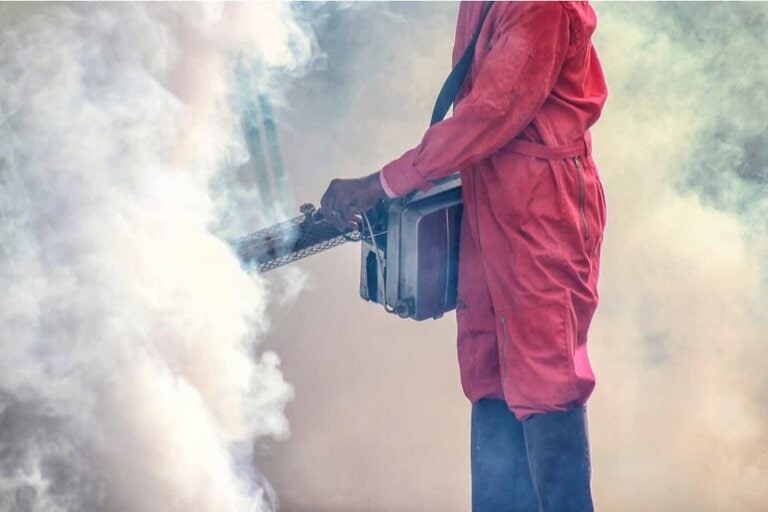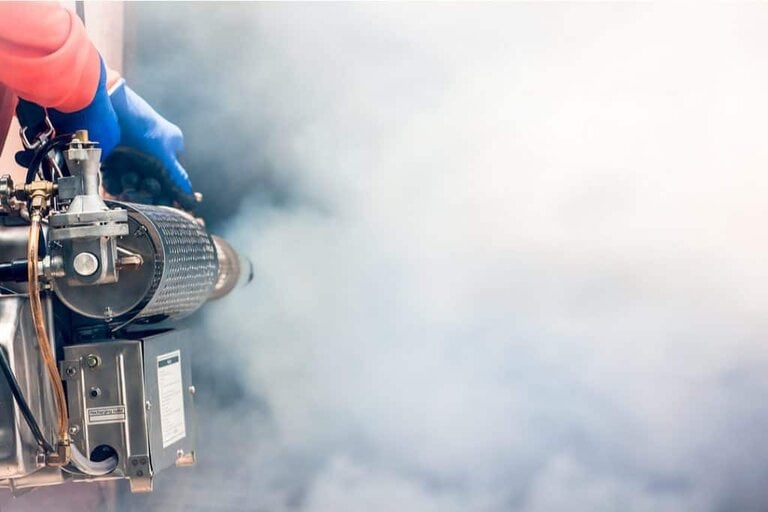After fumigation, you’ll need to spend between 24-72 hours out of your home. The exact time will be confirmed with the fumigator and will depend on the size of your property, type of infestation, and the fumigant used.
Pests like flies, roaches, spiders, and rats can eventually become huge menaces, especially in your home. Other than being pesky, they also bring several diseases that can be dangerous to your health.
To control them, one option would be the process of fumigation. It’s a method that utilizes different chemicals called fumigants to get rid of pests and insects from your home.
Fumigation is generally a hazardous operation since all fumigants used are, to some degree, dangerous to humans. This is the reason why you need to leave your home for a certain period as it’s necessary until all the chemicals used during the process dissipate entirely.
But how long should you stay out of the house after fumigation? Here we will discuss that while giving you an idea of how much time you need to let the chemicals dissipate. Of course, we will also discuss other important details too so let’s get started.

What is Fumigation?
It is a form of pest control done by entirely filling a space with fumigants/chemicals. These work by suffocating or even poisoning pests that lurk in the area.
Fumigants are utilized to control and manage pests in buildings, properties, soil, produce, and more. It’s also used when processing different goods that are exported/imported. Doing this is necessary to prevent the transfer of alien organisms to a new area.
The process also affects the structure of your property since the pests live in its physical structure. Some pests you may need to fumigate include wood borers and drywood termites.
How Long Should You Stay Out of Your Home After Fumigation?
The time you should stay out of your home depends on the nature and magnitude of your home’s pest infestation. You’ll likely have to leave your property for a couple of days to complete the fumigation process.
To be precise, you’ll need to make certain arrangements to stay out of the property for a minimum of 24-hours. However, some fumigation processes can take up to 72-hours to fully dissipate the chemicals they used.
Also, remember that only licensed fumigators can enter your home for the time being. Entering your property during fumigation can lead to a number of risks that can be harmful to your health. Doing so will also increase the chances of you spreading pests to another location.
Things to Do Before Fumigation

After the process, fumigants dissipate entirely and won’t leave a residue. But despite that, it’s still better to take the necessary steps when preparing your property for fumigation.
Here are the steps you need to follow before the process begins:
Leave Your Home During the Process
Find a place to stay during fumigation since no one, except the professionals, can enter. Remember, speaking with the fumigator beforehand will be best to ensure the clarity of scheduled events for everyone.
Remove Specific Items and Take Your Pets with You
Make sure to remove specific items from your home like house plants. Of course, you shouldn’t leave your pets too. If you have cats, dogs, birds, fish, reptiles, etc., be sure to take them with you before fumigation.
Bring All Your Consumable Products
It’s also best to remove opened food items and take your food, pet food, medications, dental products, and other consumables with you.
If certain products are kept in unopened bottles, jars, or cans and still have their original seals intact, they’re safe. These products don’t need to be removed during fumigation.
If you can’t bring opened food products like frozen goods etc., make sure to double-bag these for protection. Go for special bags that are designed for this specific purpose. Your fumigator will provide the necessary items and help ensure that all your items are properly kept.
Open Up
Open doors between rooms before you leave the house. That also includes cabinets, closets, the attic, and even the basement. Bring all your valuables because you’ll need to open all dressers, cabinets, and desks during fumigation.
Also, make sure to raise all blinds in your home and open the drapes on the windows. This will allow your fumigator to easily open windows when necessary.
Clear Access to Storage Rooms and Spaces
After opening up, make sure to clear all access to storage rooms, closets, and crawl spaces to make fumigation effective.
For the process to be complete, the fumigant needs to penetrate each corner of your property. So, having clear access to crawl spaces, storage rooms, closets, etc. will allow the chemicals to enter these hard-to-reach areas.
Rake Gravel or Mulch
Do this if you can and rake back at least a foot away from your home to expose the exterior foundation. Also, move plants by digging them up if it’s necessary for fumigation. Doing these will make it easier for fumigators, especially when it comes to tenting.
Remove or Reposition Exterior Devices
Before fumigation, make sure to lower or remove antennas, chimney stacks, weather vanes, or mechanical awnings. It’s important to remove, retract, or lower exterior devices for effective and better tenting.
Unplug Appliances and Switch off All Heat Sources
There are a couple of fumigants that may have corrosive or other reactions to heat. So if your home has natural gas service, have it switched off and locked out by your gas company. This is important since it can prevent natural gas buildup that may occur in the event of a leak.
Your fumigator may likely instruct you to unplug then switch off all heat sources like appliances, heaters, computers, etc. Then aside from your gas service, all pilot lights will need to be extinguished.
What Happens During Fumigation?
During a fumigation, the first thing that happens is the area intended for the process is covered adequately for proper sealing.
Here, professionals will set a huge tent over your home and ensure that it’s sealed shut. Then, they will release the fumigants in the sealed space.
The gas released is likely to be sulfuryl fluoride which can thoroughly access every crack or crevice in your home. This will kill all the pests that are present in the area and anything else that is living in the property.
Remember, your property will be held for a specific period while the gas seeps through the spaces. The chemicals will then kill any infestations that are present in the area.
Lastly, the fumigated space will be ventilated thoroughly so all the poisonous gasses will dissipate. The fumigators will ensure that the air is clear to render it safe for you and your family to enter.
Fumigation is a highly effective process for eliminating pests in your home. However, it can be a daunting and challenging experience if it’s the first time you’re going through it as it flips your life upside down for a few days.
So, it’s always best to approach your fumigators who will then give you more details on the process.
They’ll inform you of the health risks that one can possibly acquire from entering the property too early. And of course, they’ll inform you of the time you should spend away from your home.

How to Properly Clean Your Home After Fumigation
Once the entire process is done and you’ve finally returned to your home, it’s best to clean the space. This is to tidy up and ensure that everything is clean. Plus, it’s to get rid of any dead pests lying around.
Here’s how you should clean your home after fumigation:
- Open all doors and windows to ensure that your entire home is properly ventilated before you start cleaning.
- If you find any unsealed food that you forgot to take with you then make sure to throw it out. Unless they were completely sealed and airtight, it’s best not to take any chances.
- The vacuuming process should be two-fold. Firstly, you want to clear out any dead insects or pests that may have been killed from fumigation. This may include the likes of spiders and flies which weren’t the intended purpose of the pest control.
- After this initial vacuum, it’s best to either completely replace your bag or empty the chamber. You can then vacuum the rest of your home, making sure to clean those hard-to-reach areas such as curtains and under cushions.
- Wipe the surfaces around the house using a damp cloth to remove dust and any remaining fumigants. Discard the cloth once you finish using it. Then, mix a 50-50 solution of vinegar and water then repeat the wiping process.
- Don’t forget to wipe the doorknobs, drawers, cabinets, and cupboards. Again, discard the cloth once you’re done.
- Get rid of the remaining fumigants by mopping the floors with warm soapy water. Remember to clean the toilet and bathroom floors too. Before you finish cleaning, don’t forget to wipe the surfaces in your bathroom.
- Before replacing your beddings, remember to clean your mattress with a vacuum. You can purchase new linens if yours are fumigated.
Is Fumigation Right For You?
Pest infestations are every person’s nightmare, and if you’re dealing with this problem, don’t freak out and panic. You can easily choose products specifically for DIY pest-killing, however, it’s always best to reach out to professionals, especially when dealing with major pest problems.
And with that, fumigation is the best option. It stops pests in their tracks and deals with controlling them in sensitive environments. So no matter how small or big your pest control issue is, fumigation is key to completely solving the problem.
FAQs On How Long Should You Stay Out of the House After Fumigation
Do We Need to Wash Clothes and Dishes After Fumigation?
Washing clothes and dishes is not necessary since the fumigant is just gas. And during the process, no liquids are applied. It will just go through your clothes but it won’t stick to them. Additionally, all fumigants in the property are pumped out with industrial-sized fans during the aeration process.
How Fast Can the Fumigation Process be Completed?
Fumigation can take as quick as six hours to as long as a week depending on various factors. These factors include the size of the structure, type of infestation, temperature, dosage, and more.
What About Our Pets and Plants? Should I Take Them with Us?
All living things, including pets and plants, must be out of your home during fumigation. This included any outdoor plants that may be inside the perimeter of the tent.
